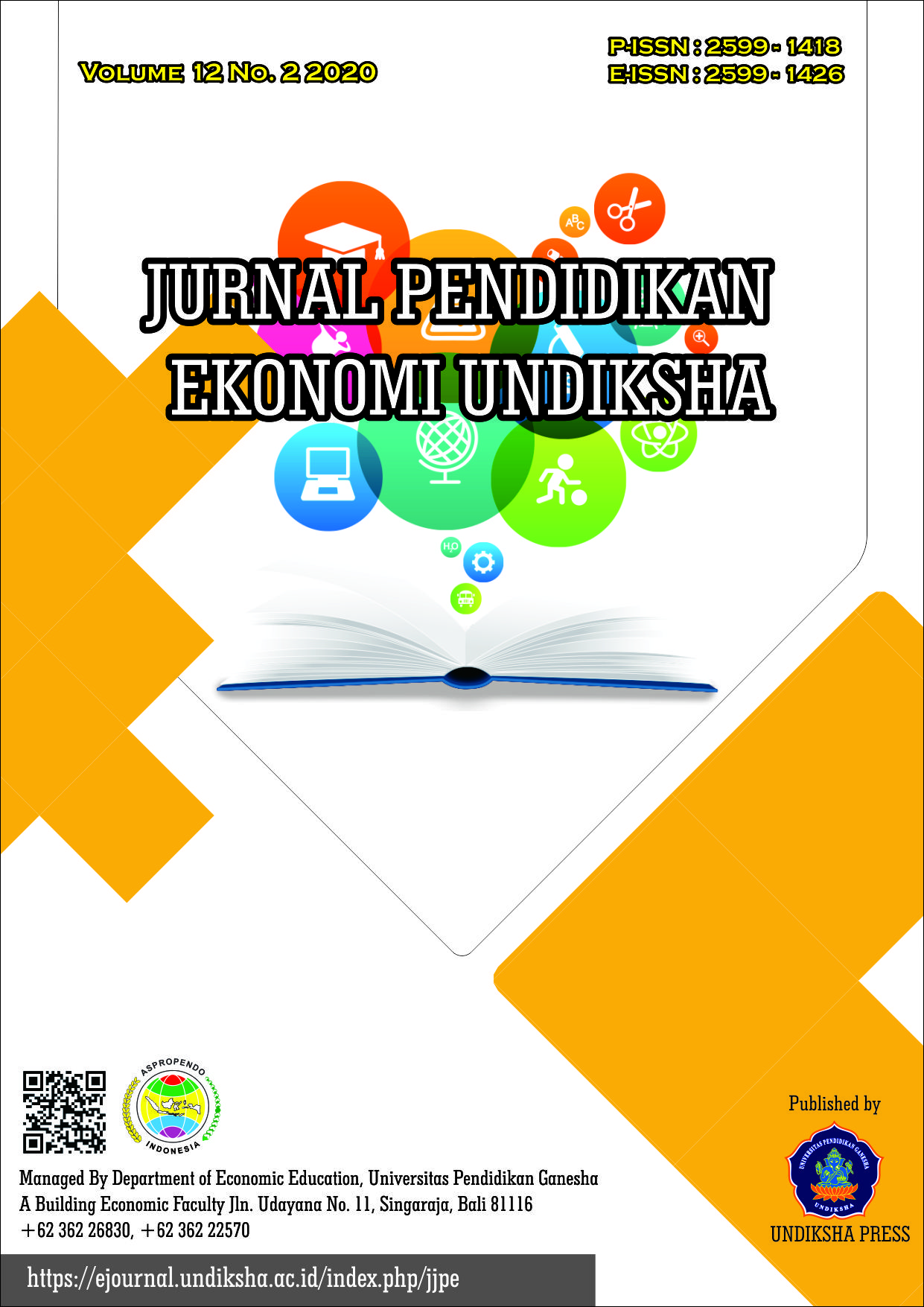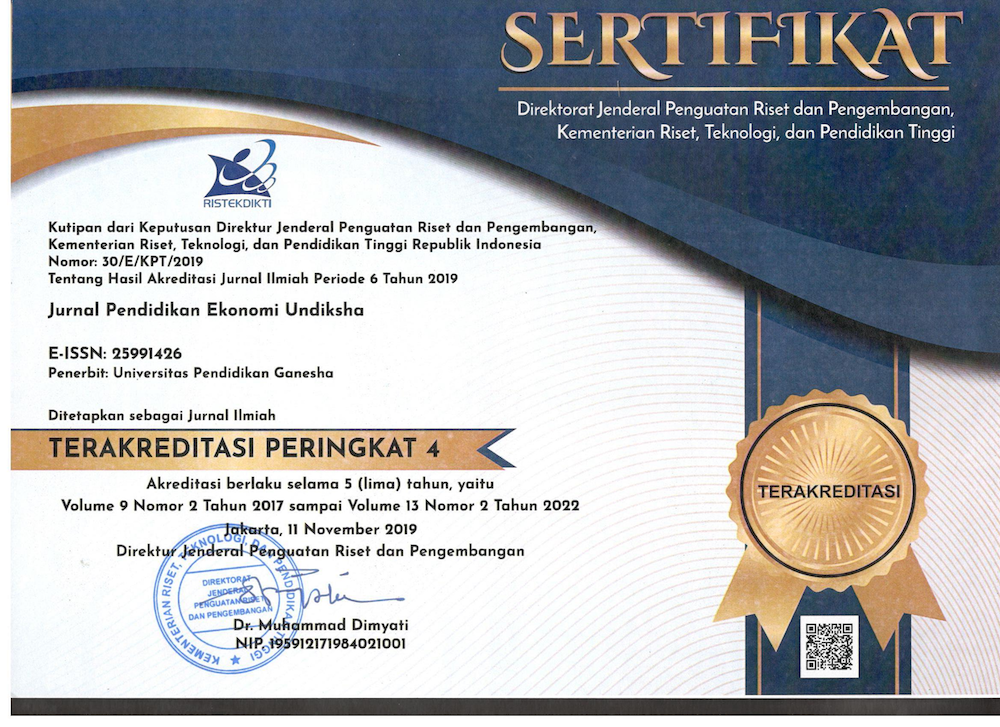Pengaruh Self Efficacy, Interaksi Sosial Terhadap Minat Berwirausaha dimoderasi Karakteristik Kewirausahaan Peserta Didik
DOI:
https://doi.org/10.23887/jjpe.v12i2.29829Kata Kunci:
self efficacy, social interaction, entrepreneurial interest, entrepreneurial characteristics of studentsAbstrak
This study aims to determine and analyze the effect of self-efficacy, social interaction on entrepreneurial interest which is moderated by the entrepreneurial characteristics of students. The method used in this study was an explanatory survey research with data collection techniques through questionnaires and observations. The population of this study is 400 students of Senior High School 1 Subang class XI for the 2020/2021 academic year with a sample of 100 students by using simple random sampling techinuques. The collected data were then analyzed using descriptive analysis techniques and multiple linear regression with Moderate Regression Analysis (MRA). The collected data were then analyzed using descriptive analysis techniques and multiple linear regression with Moderate Regression Analysis (MRA). The results showed 1) the level of interest in entrepreneurship, self-efficacy, social interaction and entrepreneurial characteristics of students were in the medium category. 2) self-efficacy had a positive and significant effect on interest in entrepreneurship. 3) social interaction had a positive and significant effect on interest in entrepreneurship. 4) the entrepreneurial characteristics of the participants moderate the effect of self-efficacy on interest in entrepreneurship. 5) entrepreneurial characteristics did not moderate the effect of social interaction on interest in entrepreneurship.
Referensi
Abu Ahmadi. (2016). Sosiologi Pendidikan. Jakarta: Rineka Cipta
Ahmed, T., Chandran, V. G. R., Klobas, J. E., Liñán, F., & Kokkalis, P. (2020). Entrepreneurship education programmes: How learning, inspiration and resources affect intentions for new venture creation in a developing economy. International Journal of Management Education, 18(1), 100327. https://doi.org/10.1016/j.ijme.2019.100327
Chrismardani, Y. (2016). Theory Of Planned Behavior Sebagai Prediktor Intensi Berwirausaha. 대한간호과학회지, 28(3), 550–562. http://www.dbpia.co.kr/Article/3031618
Farida, N. (2020). Factors Affecting Entrepreneurship Interest In “Kurasa” Student Enterprise Of Unisba Blitar. Academic Research and Science, 5(1), 36–43.
Giannetti, M., & Simonov, A. (2009). Social interactions and entrepreneurial activity. Journal of Economics and Management Strategy, 18(3), 665–709. https://doi.org/10.1111/j.1530-9134.2009.00226.x
Hermansyah, A., Natuna, D. A., & Sumarno. (2017). Kontribusi Pelaksanaan Pembelajaran Kewirausahaan dan Interaksi Sosial terhadap Karakter Kewirausahaan Peserta Didik MAN 1 Pekanbaru (Atikah Hermansyah, Daeng Ayub Natuna & Sumarno). 9, 10–113.
Janse van Rensburg, L. J., & Tjano, R. N. (2020). The relationship of self-efficacy and entrepreneurial intentions on the commitment of the next generation in family-owned agribusinesses. Acta Commercii, 20(1), 1–12. https://doi.org/10.4102/ac.v20i1.742
Karen Hapuk, M. S., Suwatno, S., & Machmud, A. (2020). Efikasi diri dan motivasi: sebagai mediasi pengaruh pendidikan kewirausahaan terhadap minat berwirausaha. Jurnal Riset Pendidikan Ekonomi, 5(2), 59–69. https://doi.org/10.21067/jrpe.v5i2.4577
Kemendikbud. (2019). Pedoman Program Kewirausahaan SMA. 57.
Lechler, T. (2001). Social Interaction: A Determinant of Entrepreneurial Team Venture Success. Small Business Economics, 16(4), 263–278. https://doi.org/10.1023/A:1011167519304
Sandi, A., & Nurhayati, M. (2020). Effect of Entrepreneurship Education, Family Environment and Self-Efficacy on Students Entrepreneurship Intention. 120(Icmeb 2019), 9–12. https://doi.org/10.2991/aebmr.k.200205.003
Seth, K. P. (n.d.). The impact of Entrepreneurship Education on Entrepreneurial Intention : An empirical study of entrepreneurship education ’ s four key characteristics.
Shneor, R., Smith, J. B., Smith, C. G., &Michael Goedecke, J. F. (2020). The Differential Impact of Entrepreneurship Education on the Entrepreneurial Intentions of Segments of Students. Entrepreneurship Education and Pedagogy, 251512742093624. https://doi.org/10.1177/2515127420936240
Sutedjo, B., Oetomo, D., & Santoso, S. (2020). The Effect of Entrepreneurship Literacy and University Support on Entrepreneurial Interest to Run Start-Up Business among Students. 4(3), 57–62.
Wardhana, A., Kharisma, B., & Ibrahim, Y. F. (2019). Pengangguran Usia Muda Di Jawa Barat (Menggunakan Data Sakernas). E-Jurnal Ekonomi Dan Bisnis Universitas Udayana, 9, 1049. https://doi.org/10.24843/eeb.2019.v08.i09.p04
Yu, S., Jixin, Z., & Xiaobo, T. (2018). How entrepreneurs utilize social interactions and lead companies to success: A new research perspective to open innovation. PICMET 2018 - Portland International Conference on Management of Engineering and Technology: Managing Technological Entrepreneurship: The Engine for Economic Growth, Proceedings, 1–7. https://doi.org/10.23919/PICMET.2018.8481841





